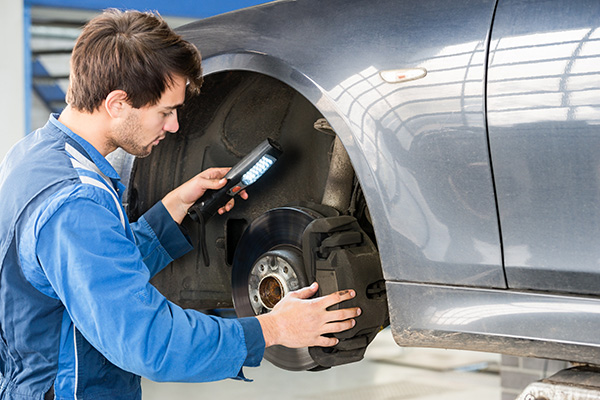
Your car’s brakes are the most essential safety feature, and they play a critical role in ensuring you can stop quickly when needed. But how do you know when your brakes are going bad? Ignoring the warning signs can lead to dangerous driving conditions or even accidents. We’ll cover the telltale signs that indicate your car’s brakes need attention. Recognizing these signs early can save you time and money and, most importantly, keep you safe on the road.
Unusual Sounds When Braking
One of the most common signs that your brakes are in trouble is the noise they make. A high-pitched squealing sound when you press the brake pedal is often a sign that the brake pads are worn down and need replacing. Brake pads are designed with a small metal indicator that creates this noise to alert drivers when it’s time for a change.
If you hear a grinding noise, this could be even more serious. Grinding usually means that the brake pads are completely worn away, and metal parts are rubbing together. This can damage your rotors, leading to a much more expensive repair. If you notice either of these sounds, it’s best to get your brakes checked right away.
A Soft or Spongy Brake Pedal
When you press down on your brake pedal, it should feel firm and responsive. If the pedal feels soft or spongy, it’s a sign that something isn’t right. A soft pedal could indicate a problem with the brake fluid, such as air in the brake lines, or it could point to a more serious issue, like a brake fluid leak. Either way, addressing the problem as soon as possible is important to ensure your car can stop effectively.
Another sign to watch for is if your brake pedal sinks to the floor when you press on it. This indicates that there could be a significant issue with your brake system, and you should stop driving immediately until the problem is resolved.
Vibrations or Pulsing in the Brake Pedal
Feeling vibrations or pulsing in your brake pedal is another sign that your brakes might be in trouble. This sensation often occurs when your rotors are warped or uneven. Rotors can become warped due to excessive heat caused by heavy braking or wear over time. When your rotors are no longer smooth, the brake pads have a harder time making proper contact, leading to the pulsing feeling when you try to stop.
Warped rotors can reduce your braking efficiency and increase stopping distances, which can be dangerous in emergencies. If you’re experiencing vibrations while braking, having your rotors checked for uneven wear is a good idea.
The Car Pulls to One Side When Braking
If your car pulls to one side when you hit the brakes, this could indicate uneven wear on the brake pads, a stuck caliper, or an issue with the brake fluid. Uneven brake pad wear can cause one side of the car to brake more effectively than the other, making the vehicle pull to one side. Similarly, a stuck caliper can cause the same problem by applying uneven pressure on the brake pads.
This pulling sensation not only affects your ability to stop quickly but also compromises your control over the vehicle. It’s important to get this checked out to ensure balanced braking performance and proper vehicle control.
A Burning Smell After Braking
If you notice a burning smell after braking, especially during heavy braking or going down steep hills, it’s a sign that your brakes are overheating. This could be due to the brake pads being worn down too much, causing excessive friction, or it could mean that your brake fluid is boiling due to heat.
Overheating brakes can lead to brake failure, so it’s important to let them cool down before continuing to drive. If the burning smell persists, it’s a sign that your brake pads or other components may need to be replaced.
The Brake Warning Light is On
Modern vehicles are equipped with brake warning lights on the dashboard, which light up when there’s an issue with the braking system. While some warning lights may simply indicate that the parking brake is still engaged, they can also point to low brake fluid levels or other more serious problems.
If your brake warning light comes on, don’t ignore it. Check your brake fluid levels first, and if that’s not the problem, bring your car to us for a professional inspection to find out what’s going on.
Noticing any of these signs? Don’t risk your safety! Visit Chahel Automotive for a thorough brake inspection and keep your car’s braking system in top shape. Contact us today to book an appointment!